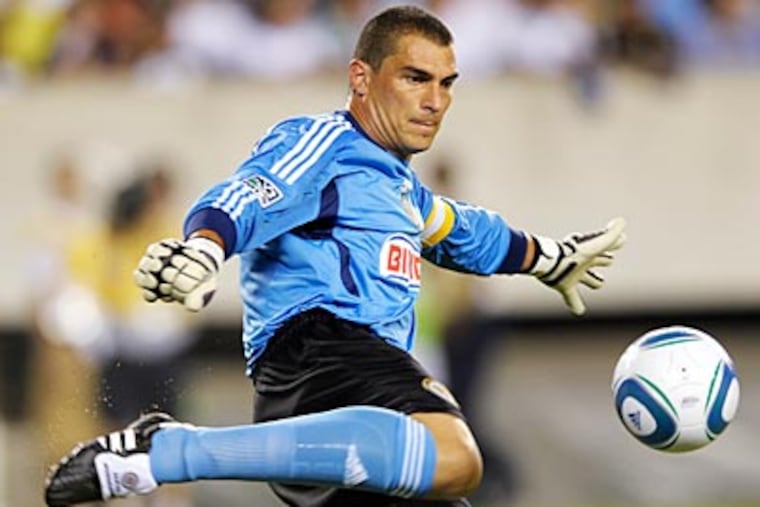
Meet today's Latin American soccer player.
A quiet commodity in Major League Soccer not only fueling the success of individual clubs, but providing a sense of validity to an ever-growing league.
According to latest racial and gender report card released in 2011 by the Institute of Diversity and Ethics in Sport, Latinos make up 20 percent of MLS' player pool, up from 17 percent in 2010. On the Union, six players hail from Latin American countries, including three newcomers. Costa Ricans Josue Martinez, Porfirio Lopez and Panamanian Gabriel Gomez join the Colombian trio of goalkeeper Faryd Mondragon, Carlos Valdes and Roger Torres, who have all been more than just timely contributors on a club eager for bigger and better things after getting a taste of the postseason in only its second season.
Success starts with Union scouting and player development head Diego Gutierrez. Along with Union boss Peter Nowak, he captured the 1998 MLS title as a player with Chicago. Today, as the Union's chief emissary, the Colombian, who maintais strong ties to that nation's relatively untapped pool of talent, helped Nowak discover what other MLS teams are starting to realize:
The Latino players are highly skilled and affordable, coming from somewhat disgruntled situations.
The People's Paper caught up with Gutierrez in the aftermath of Thursday's MLS SuperDraft to get a closer look at how this guru goes about his work.
Daily News: What makes the Latino player so special?
Diego Gutierrez: I think Latin Americans, in general, are going to be of good value, because the economics of Latin American leagues allows us to go recruiting for good players that are going to be adaptable. A lot of these leagues in South America may not be as fast as MLS, but they are filled with very physical players and really great athletes.
DN: Why do these players choose to come to MLS?
DG: The economic opportunity continues to be there, and MLS has shown to be a very viable league for these types of players. Specifically, with some of the leagues in Colombia, it isn't very organized, a lot of players aren't happy with their situations, a lot of them are getting out of contracts, so management a lot of times don't have a lot of leverage on these players to keep them, because they are looking for better opportunities. It's a market that not only us, but everybody in this league, seems to be combing through.
DN: Would you say a lot of Latin American players view MLS now as the "next level"?
DG: They do. It used to actually be where they saw this league as a step below, because MLS was always known as the retirement league. That was the perception for a long time, but for those of us that have been around this league for many of years, we've seen the evolution of MLS, and it's come a long way. These players are now seeing this as a competitive league and they know coming here provides stability and a nice life for their families.
DN: You've brought in a number of Latin American players, many of which have turned out to be key members in the success of your franchise. Without giving away too much, Diego, tell us, what's your secret?
DG: People forget that I was born and raised in Colombia and I came here after playing at the highest level in Colombia for a couple of years. A lot of the same people, players I played with, have become coaches and administrators and a lot of times, we don't have to go through agents; we can go directly through the clubs (he smirks). And sometimes I am granted information that let's just say proves to be useful.
DN: Are you confident that the guys you brought in this offseason are going to come in and make an immediate impression?
DG: It's not about immediate impressions. We are looking to build a foundation for years to come here, and first and foremost, you have to have talent. And once you identify that talented player, you have to visualize him as a player that will be a key part of your organization for years to come. In the case of guys like Carlos Valdes, Roger [Torres] and Faryd [Mondragon], even though these guys are seasoned professionals, they still have that drive and that hunger to work and get better. They become assets, because they are leaders. I feel the three players we brought here fans will see are the same way. They work hard, have a good pedigree and they want to make a name for themselves. They don't even have to speak English that well; they go on the field and compete, and no one has to question their leadership and work ethic. That's what we want here and those are the guys I will always go after.